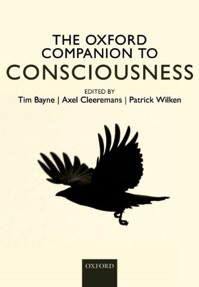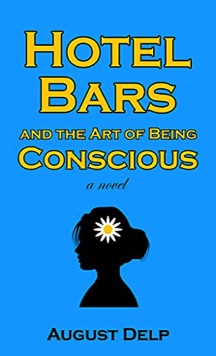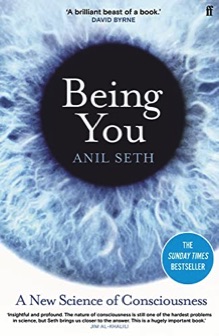The Science of Consciousness:
Chapter 1: The Problem of Consciousness
What this chapter is about: What is consciousness, and why is it such a difficult subject to study?
The psychologist Stuart Sutherland famously wrote in 1989:
A fascinating but elusive phenomenon: it is impossible to specify what it is, what it does, or what it has evolved. Nothing worth reading has been written on it.”
I hope things have changed since 1989 or else I've just wasted seven years of my life in writing this book.
Defnition of consciousness
See also Chapter 5 on whether animals are conscious, and the discussion for Chapter 8 on the difference between awareness and self-awareness.
Why is consciousness a mystery?
It's diffcult to read anything introductory about consciousness without coming across phrases such as "the mystery of consciousness". The mystery is how does the brain, a physical object, give rise to the feeling of being me? The brain is comprised of neurons - physical matter. I am made up of sensations, experiences, awareness, self-awareness (at times). Matter and mind seem to be two very different things.
I have always taken it for granted that the mind somehow emerges from the brain. I am using words like "emeges: very casually here, just as a shorthand to say I don't believe there is a soul, a different sort of substance. Before I knew much about consciousness (before writing this book) I took it very much for granted, without really thinking about the difficulties. It came as a surprised to me to read that Francis Crick (one of the discoverers of the structure of DNA) talked about the astonishing hypothesis: the idea that mental experiences are solely the result of the activity of nerve cells. When I started giving talks on consciousness (to non-psychologists) I discovered that for many people, even some scientists and medics, it was after all an astonishing idea. Many non-psychologists I have talked to do assume there is a soul, and the idea that there can only be physical matter is a bit crazy. But surely psychologists and most other scientists should know better? (Yes, I know there are some notable exceptions of leading figures who are dualists - see Chapter 2.)
The idea that consciousness doesn't arise directly from the brain's activity is surprisingly resilient, partly because the distinctions involved are confusing. Take this article in the respected online magazine The Conversation, for example, based on. To quote,
"Beliefs about consciousness can be roughly divided into two camps. There are those who believe consciousness is like a ghost in the machinery of the brain, meriting special attention and study in its own right. And there are those, like us, who challenge this, pointing out that what we call consciousness is just another output generated backstage by our efficient neural machinery."
(The "ghost in the machine" is a phrase coined by the British philosopher Gilbert Ryle to describe Cartesian Dualism.)
Halligan, P. W., & Oakley, D. A. (2021). Giving Up on Consciousness as the Ghost in the Machine. Frontiers in Psychology, 12 (April), 1–16. https://doi.org/10.3389/fpsyg.2021.571460.
There are really two claims here, not the one that appears to be made about belies about consciousness falling into two camps. You can indeed believe that consciousness is generated by our neural machinery, but I do not see why that commits you also to believing that it doesn't merit special study "in its own right". The authors' consciousness and personal experiences might not be special to them, but mine are very special to me, and everyone else I've spoken to thinks the same thing.
Part of them problem is that when some scientists realise that the the brain is all you need to explain consciousness, they think all the hard work is done, and that they have explained it. David Chalmers' distinction between the easy and hard problems of consciousness is relevant here: all this impressive science really addresses "only" the easy questions, and leaves the hard one unaddressed (see Chapter 2 for much more on this distinction). I don't want to sound dismissive of the work involved, merely to say that it doesn't awalys solve the problem scientists think it has solved. As they say, show me the scent of a roase in the brain, and I'll be impressed.
I do think part of the problem is that scientists are very dismissive of philosophers, partly because many of them are just not awayre of the huge amound of work that has already been put into this area.
Links to sites covering most of consciousness studies
John Kilhstrom maintains one of the best on his Berkeley pages. It's comprehensive and is regularly updated.
The University of Arizona Center for Consciousness Studies runs an annual conference on consciousness, every other in Tucson. The site covers the conferences but has more besides.
Christof Koch's homepage, fascinating in many ways, covering much more than the work for which he is so highly regarded. Enjoy the books he has been reading, too.
Neurobanter. A blog for all things neuroscience and consciousness.
New Scientist. Site of the UK semi-popular science magazine; unfortunately a subscription is necessary to view the full content.
Video resources
There are numerous educational videos about consciousness on sites such as Youtube.
The Brain with David Eagleman is a good recent (2015) introduction to neuroscience by PBS.
Philospher John Searle on consciousness.
Further reading
Bayne, T., Cleeremans, A., & Wilken, P. (2011). The Oxford Companion to Consciousness. Oxford: Oxford University Press. Kindle version available. ISBN: 978-0198569510.
There are several "handbooks" and "companions" to consciousness, and they're very useful things to have to, hopefully summarising the field. How do they line up?
The first thing to note about Bayne et al. is that there is confusion about the publication date. Inside my hard copy it says 2009; the website says the online version is 2010; Amazon gives the date as a reprint version in 2014. However I'm hard pressed to find any citations to work after 2006, so I assume most of the entries were finished in 2005 and 2006. This point is more than pedantry: it's important because consciousness research is a fast moving field. Therefore I consider this book to now be pretty dated.
It's massive, nearly 700 hard pages long, and made up of entries in alphabetical order on just about anything and everything related to consciousness, each written by an expert in the field. Multiple authorship means a huge variation in the readability and ease of understanding. Reflecting my expertise, I found the psychology entries straightforward, the neuroscience ones OK but a few more diagrams would have helped, and the philosophy ones more hard going, although there were exceptions. The entries written by Susan Blackmore and Daniel Dennett were exemplary, and the work would have been stronger if it had been edited so that all the entries were of the same standard. The editors have my sympathy though because putting it together must have been, as the saying goes, like herding cats as it was.
It's not a book for someone new to consciousness, such as undergraduate student taking an option in the subject. I read it like a novel, from start to finish, and it took me ages. I did know much more at the end than at the beginning, however. It is most useful as a work of reference, for people who want to learn more about individual topics. It is worth browsing though because there are some pleasant surprises in the entries. I'd completely forgotten about the refridgerator light problem, for example. Overall the entries individually and collectively are pretty balanced. Each entry has an excellent if now dated set of references for yet more detail and further reading.
There is a e-book available, but it doesn't have the colour plates of the hard version, which is a shame.
Overall then a useful addition to the overview literature on consciousness. The main problem is that it is now too dated.
Seth, A. (2021). Being you: A new science of consciousness. London: Faber & Faber. ISBN. 978-0571337705. e-version available.
An important and much praised new book describing the phenomena of consciousness and proposing a theory of its origin. I hope to write fuller notes in due course. Essential reading.
Delp, A. (2021). Hotel bars and the art of being conscious.
A novel on consciousness research and the meaning of life! The story, about cults, mind control, and finding meaning, rolls along and the book covers the main topics in contemporary consciousness research. Well worth a read early on when studying consciousness. It's slightly mysterious because I can find little about the author, and the book has no ISBN.


